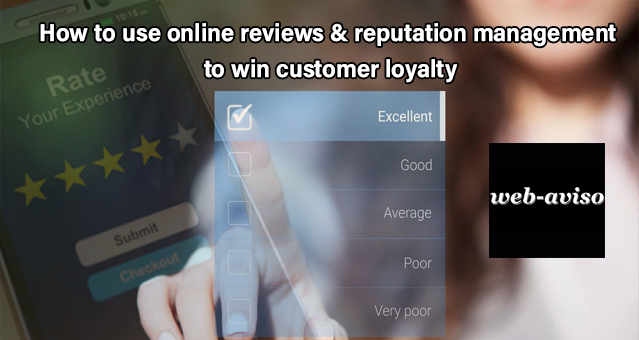How to use online reviews and reputation management to win customer loyalty
How to use online reviews and reputation management to win customer loyalty
As internet technologies become more targeted so does the way that businesses and potential customers relate to one another online. Consumers across all areas of business are no longer content to be passive recipients of business and brand marketing ...
- Customer loyalty is a fickle beast. Rather than seeking out preferred businesses and brands, many consumers now seek opinions of others who have made similar purchases. consequently reviews and ratings have a huge impact on a business or brand’s ability to attract continued and new customers.
- Consumers
are sensitive not just to the reputation of business brands in general, but also to
the reputation of specific brick-and-mortar businesses. As a result,
reviews have become an essential tool for finding the best possible purchasing
opportunity nearby – anything from pizza to childcare, plumbers to car sales ...
- It’s not only the number of review readers that’s increasing; it’s also the number of people sharing their buying and service experiences. The average customer writes 6.5 reviews per year, on average, with people in their 30s writing the most reviews.
Regardless of whether your business has just a single store or an internation estate of locations - all businesses need to engage with these behaviours or risk becoming invisible to large sections of their potential customer base.
Review management is the business process of tracking, analysing and responding to online reviews across various review websites or touchpoints where customers have evaluated the business or brand.
Although every business will have a different set of goals for this process, review management comprises of the following activities:
- Encouraging customers to leave reviews.
- Acknowledging positive reviews.
- Projecting a brand identity in the way they communicate.
- Providing a customer relations response to negative reviews.
- Escalating more serious complaints to appropriate colleagues.
- Analysing reviews for positive or negative patterns that could be useful to the business.
- Using positive reviews in social media channels, your website and elsewhere.
How Does Review Management Relate to Reputation Management?
All activities listed above have the potential to
enhance a business reputation (or harm it if they are not done well). Proactive and effective review management tenet of a business management strategy. There are both ‘reputation boosting’ and ‘reputation protecting’
aspects to this.
From the boosting aspect:
- Enhanced customer experience as you listen to what people are saying about you and respond appropriately.
- A greater understanding of your customers and building a closer relationship with them.
- Increased visibility of the brand due to better ranking in local search results.
From the reputation aspect:
- Measures for recognising and correcting misleading information about the brand.
- Showing both complainant and casual readers that your brand is doing what it can to fix the problem.
- The option to take complainant discussions offline, where necessary.
How Can Online Review Management Help My Brand?
There are many types of people and situations who you can
influence review management activities: Rnging from the reviewers themselves, potential customers who read the reviews, local businesses and even industry and societal trends - plus the influence can be far reaching:
- Loyalty:
Reviewers who leave negative feedback but receive a satisfactory response
from the brand are extremely likely to give you a second chance. In fact, 59% of customers gave a business another chance after
reviewing. But loyalty is also very easy to lose. Conversely one third of reviewers who
chose not to make a repeat visit did so because they had been ignored by
the brand.
- Trust:
Reviews are a sign of your brand’s integrity. Of course, the thought of
encouraging negative reviews can be alarming for brands, but even they
have an important role to play. 95% of customers get suspicious if they can’t see any
negative reviews.
- Approval:
Harvard Business Review reported a research study in
which hotels started responding to reviews for the first time.
Approximately one-third of the hotels increased their star rating by at
least half a star within 6 months. Simply responding has a powerful
positive influence on reviewers. Later we will also look at what makes an
effective review response.
- Sales: If you want to motivate consumers to take action and move towards making a purchase, you need to respond to as many reviews as possible. web-aviso Reputation Management report shows that businesses who reply to 20 – 30% of reviews can see an 80% higher conversion than those organisations who just respond to 10% of reviews.
What Kind of Businesses Benefit From Review Management?
There are very few areas of business activity that are not affected by reviews and a number of the benefits described above will be important goals for almost any brand. As recommendations move potential customers towards a purchase, review management really is a must – whatever your sphere of activity.
How do Reviews Affect My Physical 'Brick-and-Mortar' Business?
There is a special connection between consumer feedback on the Internet and brands who conduct business through physical locations. Consumers are very much in the habit of consulting reviews while they are out and about, looking for a good service or product within easy reach. It is well known that a high percentage of Google searches are ‘near me’ searches (search queries such as "cafe near me").
Local SEO and Organic SEO as well as off-page SEO should be embedded within all physical business location's marketing strategy - especially as searches often occur at times
when the customer is primed and ready to make a purchase, as data from SEO News shows. These searches represent a very large slice of all purchasing
activity. Going to a physical business location after researching online
is still people’s preferred way to shop., in part as the experience is tangible.:
There are two reasons why effective online review management can help to encourage consumers along this smartphone-driven journey towards a local in real life experience.
- Checking
reviews is a common part of local searches: A study revealed that 89% of consumers tend to check reviews on their
smartphones before purchasing at a brick-and-mortar business. That makes
them a great way of nudging local searchers on to the next stage in their
purchasing journey (which might be requesting directions or clicking on a
phone number or a link to the website).
- Review management aids local search positioning: Google has indicated that responding to a high percentage of reviews is one of the best ways of attracting a privileged position in search results generally. But, more specifically, it is also clear that reviews make a strong contribution to positioning in Google’s ‘Local Pack’ – one of the most important spots for attracting local searchers.
In a nutshell: All businesses should be trying to increase their star rating by responding effectively to their reviews. But many make the mistake of focusing on 1- and 5-star reviews. Prioritising 2- and 3-star reviews (where the customer is probably open to persuasion) will yield better growth in conversions.
So to conclude here are some best practices ....
Online Review Management: Best Practices
What are the keys to success in review management? Use this handy list to build your strategy. You can read a detailed description of effective review management in our Review Management guide.
- Prepare your team with a support structure of procedures and workflows.
- Respond to all online reviews – whether positive or negative.
- Go for maximum response rates.
- Respond quickly and regularly to help your search results positioning.
- Use star rating rises as goals to increase conversions.
- Keep in mind the reviews of top reviewers.
- Stick to the brand’s characteristic tone, no matter what.
- Encourage repeat visits from both positive and negative reviewers.
- Provide timely and helpful customer service – this might calm down even negative reviewers.
- Take complaint discussion offline if necessary.
- Use reviews to segment customers.
- Analyse reviews for local problems that could spread through the company.
- Examine reviews for local successes that should be applied at other sites.
- Correct false information about your brand.
- Do not artificially generate positive reviews as this harms search positioning.
Alternatively you can call on web-aviso's
online reviews and reputation management services
web-aviso have been providing digital marketing and SEO services since 2004, so we know how to get your business the attention it deserves. Contact web-aviso today to get started with a quality digital marketing business strategy
Tel : 07767343152
Email : marketing@web-aviso.com
Web : https://www.web-aviso.com
Infographics sources:








Comments
Post a Comment